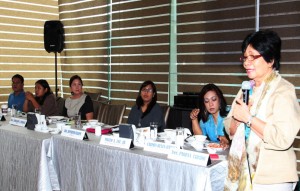
Initiatives to make the polling places accessible for voters with disabilities and senior citizens did not get remarkable impact in the last May 2013 elections, according to the National Council on Disability Affairs (NCDA), an attached agency of the Department of Social Welfare and Development (DSWD).
The NCDA added that many voters with disabilities were still disenfranchised because polling places lacked ramps or access and volunteers to assist them.
With these observations, organizations involved in promoting the welfare of persons with disabilities (PWDs), advocates and supporters reiterate their call for all stakeholders to brace up and start preparing for the needed infrastructure and support services for PWD-voters during the 2016 Presidential Election.
In a press conference during the culminating activity for the National Disability Prevention and Rehabilitation (NDPR) Week, PWD groups urged the Commission on Elections (Comelec) to establish accessible polling places and provide other forms of assistance to PWDs in voting centers on Election Day to ensure that they enjoy the right to suffrage on an equal basis with others.
According to election watchdog Legal Network for Truthful Elections (Lente), out of the 365,000 registered PWD voters, only 82,000 were able to cast their votes in the 2013 polls.
Republic Act 10366, otherwise known as “An Act Authorizing COMELEC to Establish Precincts Assigned to Accessible Polling Places Exclusively for PWDs and Senior Citizens,” enables persons with disabilities and senior citizens greater ease in casting their votes during elections.
The law which took effect on July 1, 2013, mandates the Comelec to establish a precinct that will be accessible for PWDs and senior citizens. Likewise, there should also be reasonable accommodations for PWDs and senior citizens, including assistance in the accommodation of the ballot.
The law also provides for sensitivity training programs for people who perform electoral duties, including field officers, members of the Board of Election Inspectors, and accredited citizen’s arms to familiarize themselves with the needs of PWDs and senior citizens.
NCDA has been closely working with the Comelec in formulating the Implementing Rules and Regulations of RA 10366 in consultation with leaders of PWD organizations, civil society organizations, and other government agencies to ensure that all disability issues and concerns will be addressed in upcoming elections. ###


